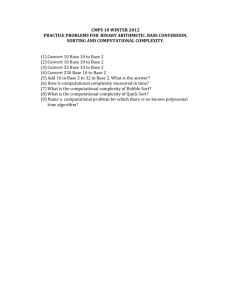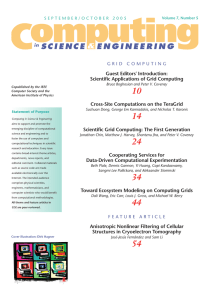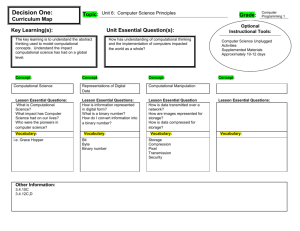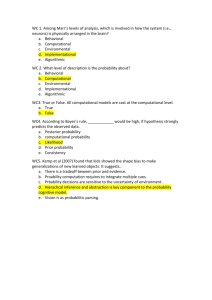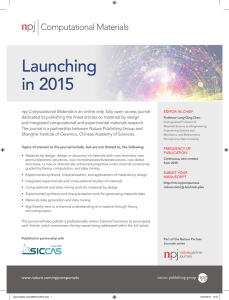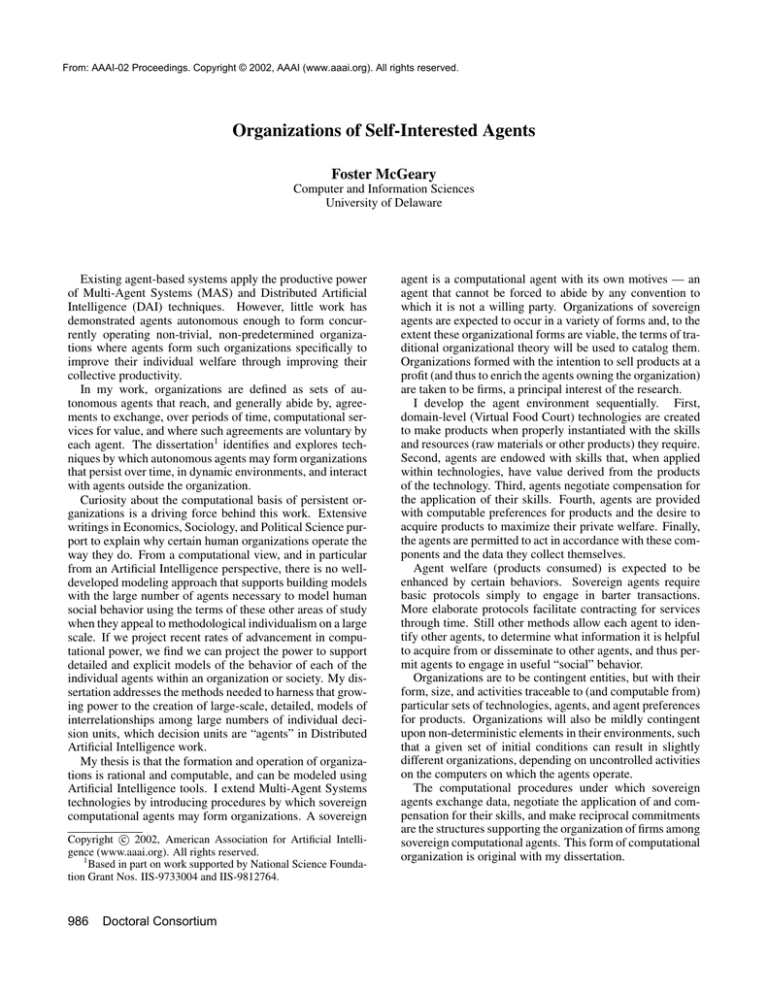
From: AAAI-02 Proceedings. Copyright © 2002, AAAI (www.aaai.org). All rights reserved.
Organizations of Self-Interested Agents
Foster McGeary
Computer and Information Sciences
University of Delaware
Existing agent-based systems apply the productive power
of Multi-Agent Systems (MAS) and Distributed Artificial
Intelligence (DAI) techniques. However, little work has
demonstrated agents autonomous enough to form concurrently operating non-trivial, non-predetermined organizations where agents form such organizations specifically to
improve their individual welfare through improving their
collective productivity.
In my work, organizations are defined as sets of autonomous agents that reach, and generally abide by, agreements to exchange, over periods of time, computational services for value, and where such agreements are voluntary by
each agent. The dissertation1 identifies and explores techniques by which autonomous agents may form organizations
that persist over time, in dynamic environments, and interact
with agents outside the organization.
Curiosity about the computational basis of persistent organizations is a driving force behind this work. Extensive
writings in Economics, Sociology, and Political Science purport to explain why certain human organizations operate the
way they do. From a computational view, and in particular
from an Artificial Intelligence perspective, there is no welldeveloped modeling approach that supports building models
with the large number of agents necessary to model human
social behavior using the terms of these other areas of study
when they appeal to methodological individualism on a large
scale. If we project recent rates of advancement in computational power, we find we can project the power to support
detailed and explicit models of the behavior of each of the
individual agents within an organization or society. My dissertation addresses the methods needed to harness that growing power to the creation of large-scale, detailed, models of
interrelationships among large numbers of individual decision units, which decision units are “agents” in Distributed
Artificial Intelligence work.
My thesis is that the formation and operation of organizations is rational and computable, and can be modeled using
Artificial Intelligence tools. I extend Multi-Agent Systems
technologies by introducing procedures by which sovereign
computational agents may form organizations. A sovereign
c 2002, American Association for Artificial IntelliCopyright gence (www.aaai.org). All rights reserved.
1
Based in part on work supported by National Science Foundation Grant Nos. IIS-9733004 and IIS-9812764.
986
Doctoral Consortium
agent is a computational agent with its own motives — an
agent that cannot be forced to abide by any convention to
which it is not a willing party. Organizations of sovereign
agents are expected to occur in a variety of forms and, to the
extent these organizational forms are viable, the terms of traditional organizational theory will be used to catalog them.
Organizations formed with the intention to sell products at a
profit (and thus to enrich the agents owning the organization)
are taken to be firms, a principal interest of the research.
I develop the agent environment sequentially. First,
domain-level (Virtual Food Court) technologies are created
to make products when properly instantiated with the skills
and resources (raw materials or other products) they require.
Second, agents are endowed with skills that, when applied
within technologies, have value derived from the products
of the technology. Third, agents negotiate compensation for
the application of their skills. Fourth, agents are provided
with computable preferences for products and the desire to
acquire products to maximize their private welfare. Finally,
the agents are permitted to act in accordance with these components and the data they collect themselves.
Agent welfare (products consumed) is expected to be
enhanced by certain behaviors. Sovereign agents require
basic protocols simply to engage in barter transactions.
More elaborate protocols facilitate contracting for services
through time. Still other methods allow each agent to identify other agents, to determine what information it is helpful
to acquire from or disseminate to other agents, and thus permit agents to engage in useful “social” behavior.
Organizations are to be contingent entities, but with their
form, size, and activities traceable to (and computable from)
particular sets of technologies, agents, and agent preferences
for products. Organizations will also be mildly contingent
upon non-deterministic elements in their environments, such
that a given set of initial conditions can result in slightly
different organizations, depending on uncontrolled activities
on the computers on which the agents operate.
The computational procedures under which sovereign
agents exchange data, negotiate the application of and compensation for their skills, and make reciprocal commitments
are the structures supporting the organization of firms among
sovereign computational agents. This form of computational
organization is original with my dissertation.

